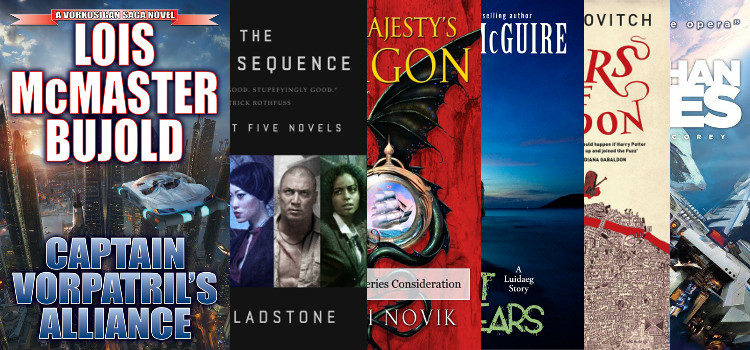Now we get to the category where I can actually seem vaguely competent because I’ve read most of them before. As you would hope, this is an extremely strong category, and my only regret is that I didn’t have time to read more books in these series.
Read for Hugos:
His Majesty’s Dragon – Naomi Novik
Master and Commander and Dragons.
This is a page turner, I picked it up and almost couldn’t put it down. It starts with Napoleonic naval action, wings over to historical fantasy, and ends with a stoking great battle. The world building is subtle, but exceptional: tactics, equipment, and housing for the dragons are presented as if they are perfectly natural, rather than invented out of whole cloth. Laurence, our swashbuckling naval captain, has an extremely strong arc going from buttoned up naval man to cuddly dragon companion, and Temeraire, the dragon, is given equally compelling growth. Most importantly for a series, I can’t wait to read the next book.
It hits all the highlights of Napoleonic fiction, but with dragons!
Rivers of London (UK)/Midnight Riot (US) – Ben Aaronovitch
A copper for the Met has a chat with a ghost and gets apprenticed to a wizard.
The best part of Rivers of London is that Peter Grant is a bit of a shitty cop. He tries hard, but just lacks the basic temperament of a copper, and it makes it a lot more believable when he messes up. The second best part is that Aaronovitch clearly loves London, and not just the famous bits, but the byways, the alleys, and those places off the beaten path. These two things combine to give this bit of urban fantasy just a bit more substance than usual. The forces at work in the story are always beyond Grant, and it’s only with help and a bit of nouse that he gets through.
A superior lead in a superior setting make for a superior urban fantasy novel.
Previously Read:
The Vorkosigan Saga – Lois McMaster Bujold
[Read 12 Novels]1
Miles Vorkosigan is one of the great characters of SF, and the Vorkosigan Saga is one of Science Fiction’s Crown Jewels. While ostensibly military science fiction, Bujold covers a swath of social science fiction looking at everything from the effects of gender selection on a feudal society to a culture built around cryogenic preservation of the nearly dead. All of this is anchored with great characters, not just Miles but virtually every character who enters frame is well developed, has clear motives, and even if the villain, is at least comprehensible. Science fiction that everyone should read.
The Craft Sequence – Max Gladstone
[Read 4 Novels]2
“Three Parts Dead” felt like a book written just for me, and if I could save one book from all of these series it would be this one. Gladstone writes high fantasy books where magic has pushed society to a point that is comparable to the modern world: a place where magicians are lawyers who restructure gods and priests are risk management consultants against supernatural threats. While the later books aren’t quite as good as the debut, they are still great.
The October Daye Books – Seanan McGuire
[Read 8 Novels]
It’s no secret I love urban fantasy, and I particularly love fairy urban fantasy.3 The October Daye books are therefore a guilty pleasure for me, I don’t think they are great books (though some of the short fiction in the series is), but I really do like them. McGuire has also created one of the really great characters in the form of the sea witch – the cryptic mother of a lost race.
The Expanse – James S. A. Corey
[Read 1 novel]
I liked Leviathan Wakes, it is a richly layered and interesting political technothriller. But I read it half a decade ago and have not felt the slightest enthusiasm to return to the series, which pretty much drops the expanse to the bottom of the category by default.
Hugo Ballot
1. The Vorkosigan Saga
2. The Craft Sequence
3. The Temeraire series
4. The October Daye Books
5. The Peter Grant / Rivers of London series
6. The Expanse
I’m extremely happy with both my first two and my last ranking in this category. The middle worries me, as it’s a little unfair (in both directions) to put one novel of two series I want to read more of against one that I am eight books into, or to compare shiny new series versus an old favourite. I can only say that depending on your poison, you can’t really go wrong reading anything in this category.
Metaphysically, it seems strange to have a best series award when NONE of the series are complete – “best continuing series” would have been better. It’s also a big ask compared to other awards, at the least you have to read half a dozen novels, and to be a completest you would need to read 50 novels and a significant number of shorter works.4
